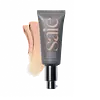What's inside
What's inside
 Key Ingredients
Key Ingredients

 Benefits
Benefits

 Concerns
Concerns

 Ingredients Side-by-side
Ingredients Side-by-side

Zinc Oxide 15%
Cosmetic ColorantWater
Skin ConditioningCoco-Caprylate/Caprate
EmollientVitis Vinifera Seed Oil
EmollientC15-19 Alkane
SolventIsocetyl Stearoyl Stearate
EmollientArgania Spinosa Kernel Oil
EmollientTocopheryl Acetate
AntioxidantSodium Hyaluronate Crosspolymer
HumectantJojoba Esters
EmollientTribehenin
EmollientBeeswax
Emulsion StabilisingGlyceryl Stearate
EmollientLeuconostoc/Radish Root Ferment Filtrate
AntimicrobialGlycerin
HumectantLactobacillus
Skin ConditioningAcacia Senegal Gum
MaskingXanthan Gum
EmulsifyingViola Tricolor Extract
EmollientBisabolol
MaskingGlycyrrhiza Glabra Root Extract
BleachingSodium Hyaluronate
HumectantAloe Barbadensis Leaf Extract
EmollientCocos Nucifera Fruit Extract
EmollientTitanium Dioxide
Cosmetic ColorantIron Oxides
Mica
Cosmetic ColorantZinc Oxide 15%, Water, Coco-Caprylate/Caprate, Vitis Vinifera Seed Oil, C15-19 Alkane, Isocetyl Stearoyl Stearate, Argania Spinosa Kernel Oil, Tocopheryl Acetate, Sodium Hyaluronate Crosspolymer, Jojoba Esters, Tribehenin, Beeswax, Glyceryl Stearate, Leuconostoc/Radish Root Ferment Filtrate, Glycerin, Lactobacillus, Acacia Senegal Gum, Xanthan Gum, Viola Tricolor Extract, Bisabolol, Glycyrrhiza Glabra Root Extract, Sodium Hyaluronate, Aloe Barbadensis Leaf Extract, Cocos Nucifera Fruit Extract, Titanium Dioxide, Iron Oxides, Mica
Water
Skin ConditioningSqualane
EmollientPolyglyceryl-3 Diisostearate
EmulsifyingMethyl Dihydroabietate
Mica
Cosmetic ColorantDisteardimonium Hectorite
StabilisingPropanediol
SolventGlycerin
HumectantIsostearic Acid
CleansingPolyglyceryl-10 Pentaisostearate
EmollientSilica
AbrasiveSodium Chloride
MaskingCocos Nucifera Water
MaskingJojoba Esters
EmollientCocos Nucifera Fruit Juice
EmollientBoron Nitride
AbsorbentSodium Hyaluronate
HumectantTocopherol
AntioxidantAscorbic Acid
AntioxidantBisabolol
MaskingTocopheryl Acetate
AntioxidantEthylhexylglycerin
Skin ConditioningPhenoxyethanol
PreservativeBenzyl Benzoate
AntimicrobialAroma
CI 77891
Cosmetic ColorantIron Oxides
Water, Squalane, Polyglyceryl-3 Diisostearate, Methyl Dihydroabietate, Mica, Disteardimonium Hectorite, Propanediol, Glycerin, Isostearic Acid, Polyglyceryl-10 Pentaisostearate, Silica, Sodium Chloride, Cocos Nucifera Water, Jojoba Esters, Cocos Nucifera Fruit Juice, Boron Nitride, Sodium Hyaluronate, Tocopherol, Ascorbic Acid, Bisabolol, Tocopheryl Acetate, Ethylhexylglycerin, Phenoxyethanol, Benzyl Benzoate, Aroma, CI 77891, Iron Oxides
 Reviews
Reviews

Alternatives
Ingredients Explained
These ingredients are found in both products.
Ingredients higher up in an ingredient list are typically present in a larger amount.
Bisabolol is famous for its skin soothing properties. It does this by blocking inflammatory signals, helping to reduce your body's reaction to irritation.
This ingredient also interferes with the process of hyperpigmentation. This can help with reducing dark spots and uneven tone.
Bisabolol is an antioxidant. Antioxidants help fight free-radicals. Free-radicals are molecules that may damage your skin cells. By fighting these free-radicals, Bisabolol may slow down signs of aging.
Studies have shown Bisabolol to have antimicrobial properties and may be a fungicide. These properties help preserve a product's shelf life.
All these properties makes bisabolol a great skin barrier helper ingredient.
Bisabolol also helps the absorption of other ingredients.
Note: Synthetic Bisabolol has been shown to be less effective.
Learn more about BisabololGlycerin is already naturally found in your skin. It helps moisturize and protect your skin.
A study from 2016 found glycerin to be more effective as a humectant than AHAs and hyaluronic acid.
As a humectant, it helps the skin stay hydrated by pulling moisture to your skin. The low molecular weight of glycerin allows it to pull moisture into the deeper layers of your skin.
Hydrated skin improves your skin barrier; Your skin barrier helps protect against irritants and bacteria.
Glycerin has also been found to have antimicrobial and antiviral properties. Due to these properties, glycerin is often used in wound and burn treatments.
In cosmetics, glycerin is usually derived from plants such as soybean or palm. However, it can also be sourced from animals, such as tallow or animal fat.
This ingredient is organic, colorless, odorless, and non-toxic.
Glycerin is the name for this ingredient in American English. British English uses Glycerol/Glycerine.
Learn more about GlycerinJojoba Esters is a wax created from Jojoba oil. It is an emollient and film-forming ingredient. In bead form, it is an exfoliator.
This ingredient has high oxidative stability, meaning it doesn't break down when exposed to oxygen.
Its similarity to our skin's natural oils makes it a great emollient. Emollients help soften and soothe our skin by creating a barrier on top. This barrier helps trap moisture in, keeping skin hydrated.
It is created using either the hydrogenation or transesterification processes on jojoba oil.
Learn more about Jojoba EstersMica is a naturally occurring mineral used to add shimmer and color in cosmetics. It can also help improve the texture of a product or give it an opaque, white/silver color.
Serecite is the name for very fine but ragged grains of mica.
This ingredient is often coated with metal oxides like titanium dioxide. Trace amounts of heavy metals may be found in mica, but these metals are not harmful in our personal products.
Mica has been used since prehistoric times throughout the world. Ancient Egyptian, Indian, Greek, Roman, Aztec, and Chinese civilizations have used mica.
Learn more about MicaSodium Hyaluronate is hyaluronic acid's salt form. It is commonly derived from the sodium salt of hyaluronic acid.
Like hyaluronic acid, it is great at holding water and acts as a humectant. This makes it a great skin hydrating ingredient.
Sodium Hyaluronate is naturally occurring in our bodies and is mostly found in eye fluid and joints.
These are some other common types of Hyaluronic Acid:
Learn more about Sodium HyaluronateTocopheryl Acetate is AKA Vitamin E. It is an antioxidant and protects your skin from free radicals. Free radicals damage the skin by breaking down collagen.
One study found using Tocopheryl Acetate with Vitamin C decreased the number of sunburned cells.
Tocopheryl Acetate is commonly found in both skincare and dietary supplements.
Learn more about Tocopheryl AcetateWater. It's the most common cosmetic ingredient of all. You'll usually see it at the top of ingredient lists, meaning that it makes up the largest part of the product.
So why is it so popular? Water most often acts as a solvent - this means that it helps dissolve other ingredients into the formulation.
You'll also recognize water as that liquid we all need to stay alive. If you see this, drink a glass of water. Stay hydrated!
Learn more about WaterThis ingredient is a combination of red, black, and yellow iron oxide pigments. This combination of colors is usually found in foundation, because it results in a "skin" color.